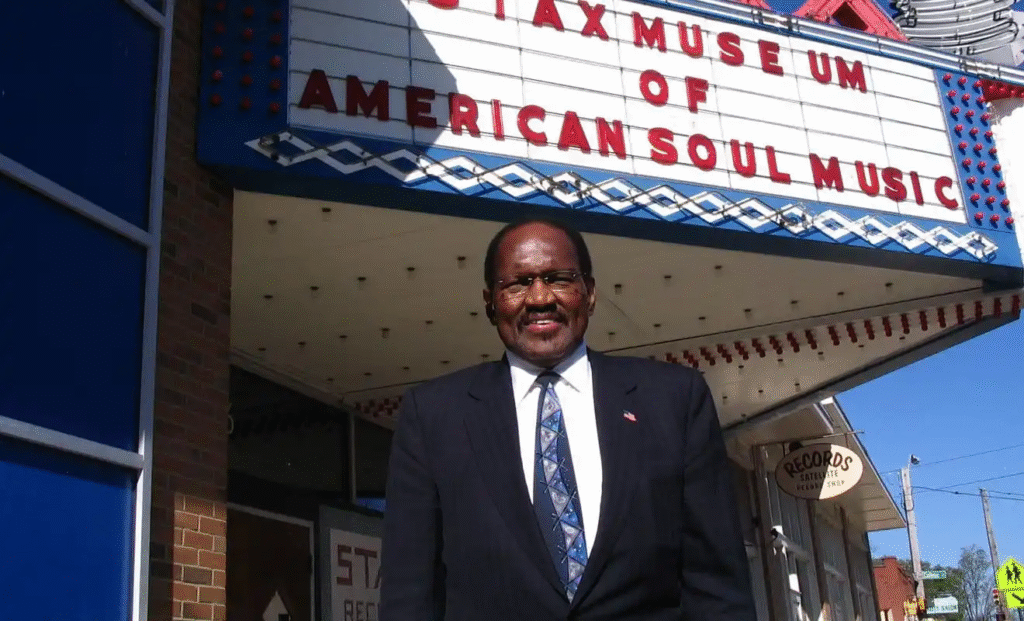Al Bell was born Alvertis Isbell in 1940 in Brinkley, Arkansas and moved to North Little Rock, where he attended the Scipio Africanus Jones High School. Education in Arkansas was segregated at this time: Scipio A. Jones High was the public high school for black children.
Bell has described on several occasions how his experiences at the school were the key to his later career. He was elected as President of the school’s Student Council and charged by his supporters with improving facilities for the students. This entailed negotiating with the principal, a skill which Al already possessed. First, he ensured that there was a salt pot on every table in the school canteen. Then he secured the agreement of the principal for the students to hold regular school dances, on condition that Al was the only one to operate the record player and that he (and his parents) would have to take responsibility for any damage to it. His parents put their agreement in writing, and the deal was done.
That left just one problem. The school did not have any records suitable for the students’ “sock-hops”. Al’s friends, a group of girls, had already worked out the solution. They would ask the students to bring in their records for each dance night and would then organize their return. Al became the school’s DJ.
Through conversations with his friends, he began to understand more and more about what songs were popular and why. Al asked why, because he was keen to become a better DJ. He couldn’t sing, he couldn’t play an instrument, but he learned to recognise a good song. Out of these conversations also came the idea for a talent contest that Al organized between his High School and Dunbar High School in Little Rock. It was held at the Dunbar Community Centre, with the punchy title of “Radio Station T-O-U-G-H”. Al organized a professional panel of judges, including the general manager of local radio station KOKY.
And there, in those experiences, you can see Al Bell’s career in embryo. The organizational skills, the negotiating skills, the management of people and the ability to pick a winner from a bunch of recordings. They were all in place before he left High School and they were visible to people in the industry. The judge from KOKY Radio contacted Al the week after the talent show and offered him a job. That Sunday morning Al hosted a programme of Gospel music and then filled in for an absent DJ on that evening’s jazz programme.
After high school, Al attended Philander Smith College in Little Rock, which gave him the opportunity to visit Georgia in 1959 to study and work with Martin Luther King Jr. Al returned to Little Rock with a firm belief that the best way to improve the lives of Black people in America was by “economic development” and “economic empowerment”. He saw black-owned businesses as the main driver for change.
After leaving college Al was offered a job at WLOK Radio in Memphis, as a disc-jockey. Soon after arriving in Memphis, he set up a record label, Devore, and started using the studio at Stax Records, which brought him into contact with owners Jim Stewart and Estelle Axton. He used his radio shows to promote records from Stax, changing his professional name to Al Bell around this time.

In 1963, Al moved to Washington DC to take up a new DJ post at WUST Radio in the city but kept in touch with Jim Stewart and kept on playing music from Stax. Whilst in Washington DC, Al teamed up with Eddie Floyd and Chester Simmons to set up a record label called Safice, which released seven singles during 1964 and 1965, having concluded a distribution deal with Atlantic. It is therefore no surprise that Stewart turned to Al Bell for advice, as he tried to widen the market for the label’s output. After two years in Washington DC, Al returned to Memphis, this time as Head of Promotion at Stax. It was his opportunity to put all that he had learned into practice. For Stewart it was make or break, as Stax was carrying a debt of $90,000 and there were problems with Stax’s distribution deal with Atlantic Records in New York. As an incentive, Bell was hoping to acquire a share of the company if he could turn things round and return Stax to profit.
Bell’s immediate contribution was to strengthen the company’s links with wholesalers and retail outlets, to make them more aware of what Stax was offering. He also focused on club owners and DJs, especially those in the ten key markets for black music that he had identified. He gave them sample copies for free and encouraged them to trust his knowledge of what would sell well. Bell claims that in nine months he took Stax back into profit, generating $1.5 million. (Source: Sid Hayman’s article on “Only In Arkansas” website).
One added bonus for Stax was the arrival of Eddie Floyd, who had come to Memphis with Al Bell to further his career at the home of Soul music. He was initially seen as a songwriter, writing “Comfort Me” for Carla Thomas and several tracks for Wilson Pickett, with Steve Cropper. Then “Knock On Wood” rose high in the charts, putting Stax firmly where Jim Stewart hoped it would be, following his appointment of Al Bell. So far, things were going really well.

Over the next couple of years Al Bell’s role in the management of Stax became more significant, as he rose to the position of vice-president. One of Bell’s early decisions was to make the four members of Booker T & the MGs plus Isaac Hayes and David Porter full time employees, rather than casually employed staff, paid by the hour. The Big Six, as they were called, were awarded a salary of $125 a week (equivalent to $1000 in 2021). They were thus able to concentrate on the work they did at Stax, without the need to top up their income with outside work. As part of the deal, a small part of the sales income received from Atlantic Records was put into a “production pool” and shared amongst the six of them, to cover the production work that they all regularly engaged in.
It was Bell who steered the company through some very choppy waters, following the death of Otis Redding and the end of Stax’s distribution deal with Atlantic Records. Atlantic had been distributing Stax’s releases between 1961 and 1965 on a gentlemen’s agreement. In 1965 the deal was formalized, with Stewart insisting that a clause be included that meant the deal would end if Jerry Wexler were no longer involved in the ownership of Atlantic. When Atlantic Records was sold to Warner/Seven Arts in October 1967, the clause was triggered, after a six-month period of grace to allow for re-negotiations. During those meetings in early 1968, it was discovered that, under the terms of the original agreement, Atlantic would now have control of all Stax’s back catalogue that had been distributed by Atlantic, up to the closing date of the distribution deal. Stewart and Wexler have both claimed that they were unaware of this clause, but it was there, in black and white. Coming so soon after the death of Otis Redding, it must have seemed to Jim Stewart that all his work up to that point was in vain. Everything seemed lost. Within a short time, Stewart organized the sale of Stax, including the lucrative publishing company, to Paramount Pictures, a division of Gulf & Western. Estelle Axton decided to leave the company, Jim Stewart stayed, but put Bell in charge.
Bell’s reaction was to set up a series of recordings, in an attempt to rebuild the catalogue as quickly as possible. New acts were signed to the label, including the Staple Singers, the Emotions, the Dramatics, the Soul Children and Mel & Tim. In addition, artists already on the roster were primed to make a series of new recordings. Bell scheduled twenty-eight albums and thirty singles for release by mid-1969. He also took on much of the work involved in the production side of things, whilst encouraging Steve Cropper and Isaac Hayes to look beyond songwriting, session work and production to making solo albums of their own. The rebuilding programme was named the Soul Explosion.
The highlight from this new output was Isaac Hayes’ “Hot Buttered Soul” album. Hayes first attempt at working as a solo artist had been a relative failure. “Presenting Isaac Hayes”, released in 1967, hadn’t sold well. But now “Hot Buttered Soul” made Isaac Hayes into a new star at Stax, as he took advantage of the freedom that he had insisted on and took his music onto a different level. Al Bell produced the album and the Bar-Kays played as the session band.
Bell now started to plan a further expansion of Stax Records into film soundtracks and live festivals. His ambitions reflect closely what Berry Gordy Jr. was planning at Motown; the two men had much in common. But some of the people at Stax were not entirely happy with Bell’s high-powered approach and, in 1971, Booker T. Jones and Steve Cropper left.
The departures had little effect on Bell’s plans, as he master-minded the soundtrack releases “Sweet Sweetback’s Baadasssss Song” and “Shaft” in 1971, followed by the live Wattstax concert in Los Angeles in 1972 and the Wattstax film in 1973. The Staple Singers recorded two major hit singles during this period, “Respect Yourself” and “I’ll Take You There”, which further enhanced the label’s appeal. The first of the songs was written by Luther Ingram and Mack Rice. The second was written by Al Bell, inspired by a visit to his old hometown of North Little Rock to attend his brother’s funeral. Both were recorded not at Stax but at Muscle Shoals, with overdubbing and mixing completed by Terry Manning in Memphis. Bell’s song went to number one on the Billboard Hot 100, on the Billboard R&B chart and on the Cash Box Top 100. It also charted in the UK, reaching number twenty on the Pop chart.
With Stax in a healthier position financially, Stewart and Bell organized the repurchase of Stax from Gulf & Western, two years after its initial sale, with Bell becoming part owner of the company. He was soon able to buy out Jim Stewart and become sole owner.
Bell signed a distribution deal with CBS Records in 1972, that he hoped would put an end to problems created by Atlantic four years earlier. Unfortunately, that was not to be. Disputes with CBS resulted in failures in the distribution process, which meant that Stax records were not being made available for sale. CBS also withheld payments to Stax, with the result that Stax was forced to borrow heavily from the Union Planters Bank in Memphis. Jim Stewart returned to Stax, mortgaging his house in Memphis to raise funds to support his old company. As the company took on further debts, bankruptcy loomed.
Bell was indicted for bank fraud as a result of the company’s financial failure but was acquitted. He returned to Little Rock and, for ten years, left the corporate music world alone. Then, in the eighties, Berry Gordy asked Bell to join Motown, to facilitate the sale of Motown Records to the MCA/Boston Ventures Group.
In the nineties, Bell set up Al Bell Marketing in Los Angeles, with its own record label Bellmark Records specializing in Gospel music. There was also a subsidiary label for other genres, called Life Records. A range of artists were signed to the label, including the Dells, Mavis Staples, Rance Allen, and Johnny Guitar Watson. The two most successful acts were Tag Team and Duice. Duice’s “Dazzey Duks” achieved double platinum status, reaching number twelve on the Pop chart and number nineteen on the R&B chart in 1992. Tag Team’s single “Whoomp! (There It Is)” was one of the fastest-selling singles ever, becoming certified by the RIAA as quadruple platinum, reaching number one on the R&B chart and number two on the Pop chart in 1993. Bellmark also distributed one of Prince’s songs that Warner Bros had turned down. “The Most Beautiful Girl in the World” was released on Prince’s NPG Record label. It went to number one on the UK Pop chart in 1994 and number three on the Billboard Hot 100.
In 2008 Al Bell set up a new venture back in Little Rock, Arkansas, which he called Al Bell Presents. It is an on-line radio show, with Al Bell as host, which focuses on the Soul music of Memphis and beyond.
The following year Bell was invited back to Memphis to become chairman of the Memphis Music Foundation. The aim of this organization is to rebuild the city’s reputation in the world of popular entertainment. Once more the city has called on Al Bell!
In 2011 Bell added another major award to the long list of his honours. He was given the Grammy Trustees Award for his services to the music industry, joining a very elite group of people.
Those services continue still. In 2018 he became the McIlroy Family Visiting Professor in the Visual and Performing Arts at the University of Arkansas. The story goes on, an amazing mixture of highs and lows, with Stax at the heart of it.















